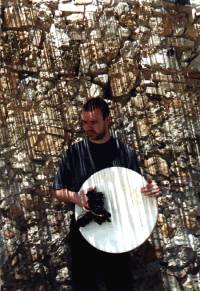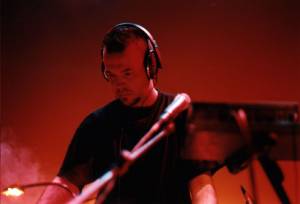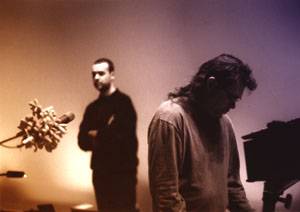 Belgian composer Vidna
Obmana creates imaginative, deep atmospheric music. He has worked with Steve
Roach, Robert Rich, Asmus Tietchens, and other musicians.
Belgian composer Vidna
Obmana creates imaginative, deep atmospheric music. He has worked with Steve
Roach, Robert Rich, Asmus Tietchens, and other musicians.INTERVIEW WITH
VIDNA OBMANA
By: Jorge Munnshe
 Belgian composer Vidna
Obmana creates imaginative, deep atmospheric music. He has worked with Steve
Roach, Robert Rich, Asmus Tietchens, and other musicians.
Belgian composer Vidna
Obmana creates imaginative, deep atmospheric music. He has worked with Steve
Roach, Robert Rich, Asmus Tietchens, and other musicians.
Please tell us about your current activities.
"At this very moment I'm overviewing the future a bit and preparing a couple of upcoming projects with designing sounds and mapping out the recording sessions. I just finished my new solo album Crossing the trail, momentary in production at the Projekt office and scheduled for a release in March/April. This album sets the mood for a new area of moods and harmonies I'll explore in the future and is surely a departure from my previous album The River of Appearance. Currently I'm exchanging ideas with guitarist Jeff Pearce for our collaborative album True Stories, which we'll record this year as well. Another exclusive contribution is to be found on Hypnos double CD The other world which should be out around this time. This year my agenda for concerts will be kept to a minimum since other commitments and projects are priority, although a couple are being negotiated. I do hope to visit the US for a series of concert in 1999."
When did you become interested in music, and composing?
"I have never known what really made me do music. As a child I always had been interested in different kinds of music, especially film music in such a way as to its instrumental style and how it could provoke a certain atmosphere. Early 80’s I started out experimenting with sound on a fairly low-budget manner, going through different styles in order to discover a genre wherein I could feel myself personally quite close to. From almost pop music to industrialism, it never helped to find the satisfaction I wanted to feel. Four years later, I expanded my studio with some more high-technology keyboards. This really helped me to define the sound, I was pursuing, and took the chance to record more meditative, calm and fragile music. Direct access to such instruments with which I really could carve out my sounds precisely, made me grow as a musician and composer. While releasing self-produced tapes, I got to discover the technique of loops and shaping harmonies with merging layers of sounds and meticulously building up the structure of each track. I guess my persistence in using this compositional technique made me carve out that specific character I’m still working with nowadays."
How much of your music is improvised? How is the process you follow to compose / record a piece?
"I think I can derive the most inspiration from the mood I’m in at the moment of the recording or from experience. So you can probably say the music of Vidna Obmana relies on my frame of mind. Of great importance in the composing process are the ideas before, creating music in my mind and sorting out where to go from the moment I step into the studio. I guess in my case the creation of the basic structure demands the most inspiration, the finishing touches are almost happening in a state of trance, induced by the basic loopings. You know that my continuing process is one of always returning to the use of my loopings, whether acoustic or electronic, and that’s basically the inspiration to each piece of new music. So around these structures of loops, I'm moving with a lot of freedom to improvise and capturing specific combinations, which fit nicely to the core. The momentum is indeed quite essential. I too think that the spiritual value of me as composer and my music is just the intimate quality in the studio. The natural flow of composing really conducts the appropriate atmosphere and myself how to respond and structure everything. I do have a passion for serenity and calmness and how I have set up the studio, induces that feeling."
Are the collaborations with other musicians an occasional experience for you, or do you think that an important part of your musical creativity could be adequately directed within a collective project as for instance a stable band? Can you tell us about your collaboration with Steve Roach and other musicians? How did you decide to work with them?
 "I enjoy
collaborating with other musicians very much, who I admire for their honest vision,
passion and modesty. Meanwhile I’ve worked together on albums with PBK, Sam
Rosenthal, Djen Ajakan Shean, Alio Die, Robert Rich, Asmus Tietchens and more
recently with Steve Roach. I personally find collaborating is a very
precious part of a musician’s evolution, to share knowledge on how to play various
instruments and support each other towards different areas of inspiration. Both can still
learn from the process of recording and creating music together. It must maintain a
spontaneous process which I was quite fortunate to experience with all my colleagues,
educational not routine. For instance with Steve Roach, it was the first
time I worked together real time in the studio and I’m very happy I did since Steve
and I became close friends. The Spiritual Bonding and Well of Souls,
both albums were true confirmations of how much we had in common in terms of music and
life. Both works granted us the space and time to dig deep into ourselves and meet the
challenge together, exploring the different nuances we hardly would achieve solo. With Steve
I hardly need words to describe or plan structures but therefore communicate through our
world of sounds as we both feel it’s this that lets our music breathe. Through this
series of collaborations with Steve, we created really a strong bonding
which brought us together on stage as well. Looking for other dimensions to add to our
creative process, we met the challenge to perform our music live together and it really
worked. Meanwhile we did our third project Ascension of Shadows together, again
in continuation of where we left off with Cavern of Sirens. Our story continues.
Another rewarding understanding I've with German electro-acoustic composer Asmus
Tietchens who's, beside Steve, an artist I really respect and
appreciate. With Asmus we operate on a totally different level and the
music is somehow different from my other projects and albums as well. Although I feel
there're a lot of similarities to discover from listening to both exercises. Together with
him I focusing on the process and technique of recycling. We exchange complete tracks upon
which we each will process and recycle each other's songs, shaping and creating a
different mood and texture. A technique we initiated on our first collaboration and which
continues on our 2nd album Linear Writings for 1999. Meanwhile we're already
mapping out a third sequel. With most of the other musicians and colleagues, I’ve
worked through mail by exchanging music, ideas and thoughts, on a more individual basis."
"I enjoy
collaborating with other musicians very much, who I admire for their honest vision,
passion and modesty. Meanwhile I’ve worked together on albums with PBK, Sam
Rosenthal, Djen Ajakan Shean, Alio Die, Robert Rich, Asmus Tietchens and more
recently with Steve Roach. I personally find collaborating is a very
precious part of a musician’s evolution, to share knowledge on how to play various
instruments and support each other towards different areas of inspiration. Both can still
learn from the process of recording and creating music together. It must maintain a
spontaneous process which I was quite fortunate to experience with all my colleagues,
educational not routine. For instance with Steve Roach, it was the first
time I worked together real time in the studio and I’m very happy I did since Steve
and I became close friends. The Spiritual Bonding and Well of Souls,
both albums were true confirmations of how much we had in common in terms of music and
life. Both works granted us the space and time to dig deep into ourselves and meet the
challenge together, exploring the different nuances we hardly would achieve solo. With Steve
I hardly need words to describe or plan structures but therefore communicate through our
world of sounds as we both feel it’s this that lets our music breathe. Through this
series of collaborations with Steve, we created really a strong bonding
which brought us together on stage as well. Looking for other dimensions to add to our
creative process, we met the challenge to perform our music live together and it really
worked. Meanwhile we did our third project Ascension of Shadows together, again
in continuation of where we left off with Cavern of Sirens. Our story continues.
Another rewarding understanding I've with German electro-acoustic composer Asmus
Tietchens who's, beside Steve, an artist I really respect and
appreciate. With Asmus we operate on a totally different level and the
music is somehow different from my other projects and albums as well. Although I feel
there're a lot of similarities to discover from listening to both exercises. Together with
him I focusing on the process and technique of recycling. We exchange complete tracks upon
which we each will process and recycle each other's songs, shaping and creating a
different mood and texture. A technique we initiated on our first collaboration and which
continues on our 2nd album Linear Writings for 1999. Meanwhile we're already
mapping out a third sequel. With most of the other musicians and colleagues, I’ve
worked through mail by exchanging music, ideas and thoughts, on a more individual basis."
Do you think you have one permanent style? Or does your style change with every work?
"I’ve been exploring different areas of electronic music over the years but feel these different exercises are very much related to each other. I also feel it’s quite important that you can witness an evolution of a composer’s repertoire in progress. I never exercise a particular idea before actually exploring the basics. That’s why I kept my evolution as an artist strictly under control and will do so in the future. Letting the inspiration flow bit by bit. The good thing is now that I’m able to pull new inspiration from previous works and periods I explored in the past, and simultaneously discovering new elements. For my new solo album Crossing the trail, I’m definitely moving ahead without denying my passion for certain older techniques as well. I also feel that due to my persistence in techniques and production made a particular style or character to come to live, which is now more or less a trademark of my music. Creating and expanding these techniques over the years offers you a freedom now to step away and back, incorporating new elements and experiences."
How is your current studio? What instruments and other musical equipment do you have in your studio?
"My current set-up includes as main keyboard the Korg M1, rackmodules Korg O1/W and Clavia’s Nordlead. So, beside effect processors, recording gear and an array of acoustic instruments, my set-up is pretty simple but quite effective. The serenity studio has a very minimal look which I find really important to find my pace when recording an album and it induces the feeling in shaping the minimal structures I adore so much to work with. Over the years as well, the minimal set-up became also very effective for creating my approach towards tribal rhythms and the more dynamical aspect of my music."
 What do you think of the
definition "Ambient Music"?
What do you think of the
definition "Ambient Music"?
"Well, I’m always quite careful when discussing classification of any sort of music since it’s really hard to distinguish one style from the other. I find it hard to explain such a definition as Ambient Music. In my opinion, the term "Ambient Music" is being used too much for almost every style which has to do with bringing up particular atmospheres. Today, it’s somehow an indescribable term I hardly use myself. I feel that the association of Ambient Music with Eno’s philosophy is too strong to define your own music the same. And in fact, if you look at its original definition Ambient Music is quite a restricted term which hardly can be used for particular music that is being created now. That’s why I prefer to name my music atmospheric since it definitely doesn’t define a certain area of music I’ve to work in. This way I do realize there’s much more to pull from."
Do you think your music has some points of contact with Science Fiction?
"I don't know and it might be a perfect question to ask the listener. I do have my personal reasons why I'm making this kind of music and how I'm feeling related to my art. I never felt the urge to connect my music with any philosophy, wheter it's SciFi or religious, since I still think every listener needs the ability to experience the music in their own pace and with their own imagination. Pinning it down to a certain theme or story limits that awareness, I think. But, yes, perhaps there's something present which relates to more futuristic and undefinable terrain."
What do you think the musical scene will be in the next century?
"Don't have a clue but what I do know is that looking at all these hypes and tendencies of nowadays covering the music scene, I'm afraid a lot of listeners will loose grip on the integrity and authentic meaning of music. Together with all mainstream press, the music business tries to keep up with what is new and provocative, while they're getting nearby suffocating themselves with the artificial concepts in the hope of raising the sales. Unfortunately, this makes it even harder for us as well to stay alive in the mid of it all since we don't have the foundation to compete with big brother. Maybe it's that "fin de siècle" feeling that is creating this over-flow. Hopefully next century brings the solution but meanwhile keeping yourself on the path holds your own vision alive."
Would you like to add something else?
"Well, I can only wish I'll continue to have the ability to create the music in my own pace and to share it with people worldwide. After all, in this line of music, our world is small and each response I receive, accentuates the pleasure of making the music."
Do you wish to purchase any recordings
by this artist/band? It's very easy, click here: